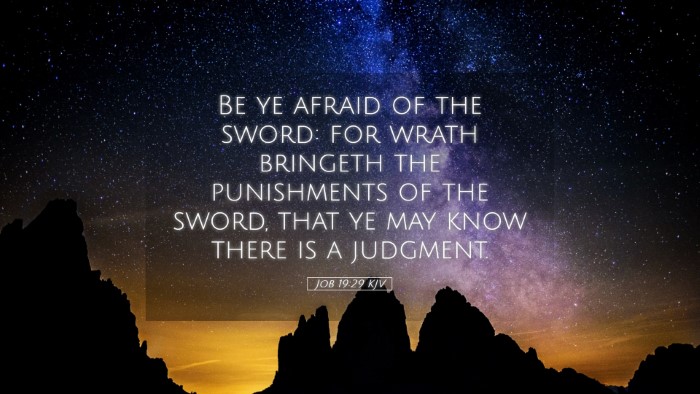Old Testament
Genesis Exodus Leviticus Numbers Deuteronomy Joshua Judges Ruth 1 Samuel 2 Samuel 1 Kings 2 Kings 1 Chronicles 2 Chronicles Ezra Nehemiah Esther Job Psalms Proverbs Ecclesiastes Song of Solomon Isaiah Jeremiah Lamentations Ezekiel Daniel Hosea Joel Amos Obadiah Jonah Micah Nahum Habakkuk Zephaniah Haggai Zechariah MalachiJob 19:29
Job 19:29 KJV
Be ye afraid of the sword: for wrath bringeth the punishments of the sword, that ye may know there is a judgment.
Job 19:29 Bible Commentary
Commentary on Job 19:29
Verse: "Be ye afraid of the sword: for wrath bringeth the punishments of the sword, that ye may know there is a judgment."
The verse under consideration is a profound declaration made by Job, as he faces a moment of immense personal suffering and existential questioning. The context of Job's words reflects a wider spiritual battle and an appeal for justice in the face of unmerited affliction.
Contextual Overview
Job, a man of great integrity and faith, finds himself in dire straits. His friends accuse him of hidden sins, yet Job maintains his innocence. This verse comes as a warning, indicating Job's understanding of divine retribution and the consequences of unjust actions.
Insights from Public Domain Commentaries
-
Matthew Henry:
Henry emphasizes the importance of the human conscience in understanding divine judgment. He notes that Job's declaration carries weight as he reflects on the temporary nature of his sufferings against the backdrop of ultimate divine justice. He advises the reader to fear the sword — a metaphor for judgment — as it serves to remind believers of the reality of God's retribution.
-
Albert Barnes:
Barnes interprets this verse as a poignant caution from Job, reinforcing the concept of justice in the divine economy. He posits that the 'sword' symbolizes severe punishment that is inevitable for the wicked. The underlying message encourages the afflicted to seek righteousness and to be mindful of God's impending judgment.
-
Adam Clarke:
Clarke sheds light on the human condition in the light of suffering and divine oversight. He draws parallels between Job's plight and the universal experience of injustice, suggesting that the acknowledgment of God's judgment is both a comfort and a call to righteousness. Clarke's reflections invite readers to contemplate the protective nature of divine authority and the fate of those who oppose it.
Theological Implications
This verse serves as a crucial reminder that suffering should not lead to despair, but rather to a deeper understanding of God's justice. A careful examination reveals several theological themes:
-
Divine Justice:
The verse articulates a clear assertion of divine justice, reflecting the belief that God will ultimately punish wrongdoing while vindicating the righteous.
-
The Nature of Fear:
The fear referred to in the text is healthy and constructive, serving as a motivator for ethical living and reverence for God's law.
-
Consolation in Affliction:
For pastors and theologians, Job's words remind them that in times of suffering, believers can still hold fast to the hope of divine justice, knowing that God's nature is one of righteousness.
Applications for Ministry
In pastoral practice, Job 19:29 provides crucial insights into ministering to those who face trials. The themes of justice and divine oversight can form the basis of comforting messages and sermons that address the reality of suffering while encouraging faith in God’s ultimate plan.
-
Encouragement in Trials:
Pastors should derive from this scripture a robust theology of suffering that provides hope and assures the afflicted that their pains are not unnoticed.
-
Call to Righteousness:
Church leaders can use this verse to challenge their congregations to examine their lives and pursue holiness, presenting God's justice not only as a warning but as a promise of peace for the righteous.
Conclusion
Job 19:29 encapsulates a powerful reminder of the nature of divine justice and the responsibilities of human beings in response to God's authority. For scholars, pastors, and theologians, it presents a deep well of theological reflection that affirms God's sovereignty, encourages ethical living, and ultimately provides hope in suffering. In discerning this scripture, one emerges not only with an understanding of divine justice but with a clearer vision of the hope that exists for the faithful in the midst of adversity.


